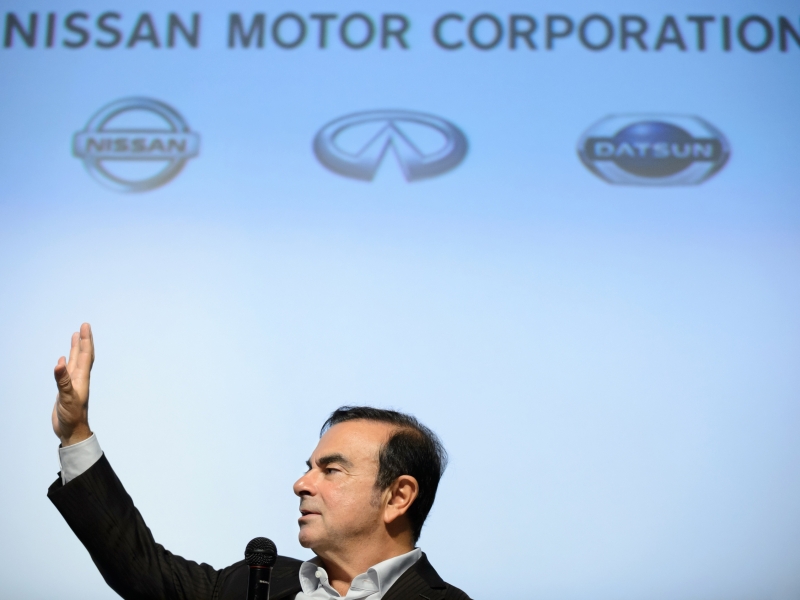
TOKYO — Japanese prosecutors re-arrested Nissan Motor Co.’s former chairman Carlos Ghosn on fresh, more serious allegations of financial misconduct, dealing a blow to the car titan’s efforts to end his month-long stay in jail and seek bail.
Prosecutors also raided Ghosn’s residence in Tokyo on Friday in search of evidence, broadcaster TV Asahi reported.
The Tokyo prosecutor said the fresh arrest was based on suspicions that around October 2008, Ghosn shifted personal trades to the automaker to make it responsible for 1.85 billion yen ($16.6 million) in appraisal losses, and inflicted damage on Nissan by having it deposit a total of $14.7 million on four occasions between June 2009 and March 2012 into a related bank account.
The re-arrest gives prosecutors the right to detain Ghosn for at least a further 10 days and possibly longer, while potentially hurting his chances for bail after that. Ghosn’s lawyers declined to comment.
The development is a big reversal from events of last night when the Tokyo district court refused to entertain prosecutors’ plea to extend the jail detention of Ghosn. That had raised the prospect that his lawyers may be able to seek bail and get him out of prison to wait for his trial.
The dramatic turn of events also came hours after Ghosn, through his lawyer and quoted by Japanese public broadcaster NHK, vowed to restore his good name in court and to hold a news conference after his release.
Ghosn was originally arrested on Nov. 19, and he and Nissan were indicted on Dec. 10 for falsifying securities reports which under-reporting his income by tens of millions of dollars. Ghosn has denied wrongdoing.
The new allegations would be in violation of Japan’s Companies Act and is seen as a more serious charge than under-reporting income, part of the Financial Instruments and Exchange Act. Japan’s Companies Act states that such a charge could carry a maximum prison sentence of up to 10 years and 10 million yen fine.
Ghosn’s lawyers have previously denied such suspected wrongdoing, which was reported by the Asahi newspaper last month but wasn’t part of the original indictment last week. Ghosn has acknowledged consulting Nissan about the collateral related to the derivatives contract, but didn’t transfer the losses to the automaker, Motonari Otsuru, a lawyer representing the former chairman, told Bloomberg Nov. 28.
‘More than corporate malfeasance’
“It’s a very serious charge,” said Colin Jones, a professor of law at Doshisha University in Kyoto. “If there was a conviction, I think it would mean that there’s been a judgment that it’s more than just typical self-dealing corporate malfeasance but something that really harmed the company and was particularly malevolent in terms of the amount of planning that went into it.”
By detaining him longer, prosecutors are making it more difficult to Ghosn to start mounting a defense. Japan’s prosecutors have faced criticism for a lack of clarity and communication on how they are handling the case, with Ghosn held in detention without charge for longer than would be permitted in the U.K. for a suspected terrorist.
The arrest of the high-flying executive on Nov. 19 at Tokyo’s Haneda airport has rocked the world’s biggest auto alliance, raising questions over whether the decades-long partnership between Nissan and French partner Renault will survive his downfall. Renault has kept Ghosn as chairman and chief executive officer, saying it needs evidence of wrongdoing before moving to replace him.
Ghosn has been widely credited with saving Nissan from failure and bringing it together with Renault to create a formidable auto union. His arrest came after a months-long investigation by Nissan into his conduct and compensation that was largely kept from its French partner. That lack of transparency and concern Nissan will use Ghosn’s absence to push for more power within the alliance has heightened tensions between the two automakers.
Much of the case had thus far seemed to revolve around Ghosn deferring pay from Nissan until his retirement, compensation that was allegedly not reported by the carmaker. Ghosn’s lawyers have said the charge is flawed because the compensation agreement wasn’t properly ratified, according to Otsuru. Otsuru is a former head of a special investigation task force of the Tokyo public prosecutor’s office.
Nissan has also accused Ghosn of misusing company funds, including over homes from Brazil to Lebanon. Nissan CEO Hiroto Saikawa — a one-time protege of Ghosn — has emerged as a driving force in the carmaker’s investigation into the alleged wrongdoing by Ghosn and his aide Greg Kelly, who is also indicted in the case.
The arrests were the result of a coup by executives including Saikawa, Kelly’s wife, Dee Kelly, said in a video released Wednesday. Saikawa was asked on the day Ghosn and Kelly were arrested whether a coup was underway at Nissan. He replied: “That is not my understanding. I didn’t make such an explanation and think you should not think of it that way.”
Kelly’s lawyer, Yohei Kitamura, said on Friday that Kelly was unlikely to be released before Tuesday because there was not enough time to complete procedures, including the payment of any bail that might be set.
Reuters contributed to this report
Be the first to comment